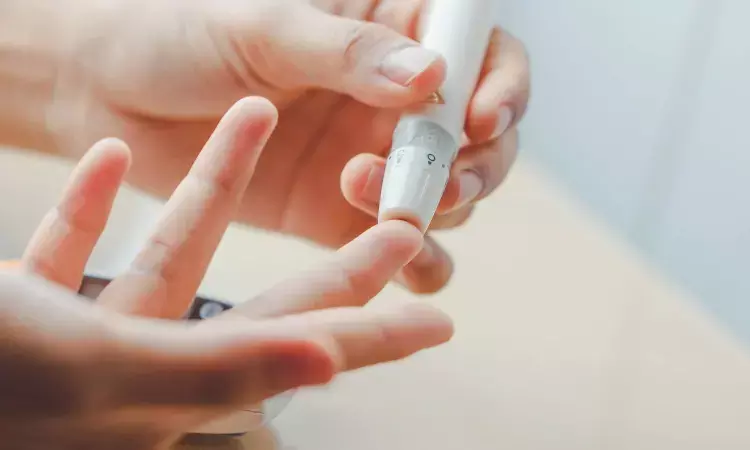- Home
- Medical news & Guidelines
- Anesthesiology
- Cardiology and CTVS
- Critical Care
- Dentistry
- Dermatology
- Diabetes and Endocrinology
- ENT
- Gastroenterology
- Medicine
- Nephrology
- Neurology
- Obstretics-Gynaecology
- Oncology
- Ophthalmology
- Orthopaedics
- Pediatrics-Neonatology
- Psychiatry
- Pulmonology
- Radiology
- Surgery
- Urology
- Laboratory Medicine
- Diet
- Nursing
- Paramedical
- Physiotherapy
- Health news
- Fact Check
- Bone Health Fact Check
- Brain Health Fact Check
- Cancer Related Fact Check
- Child Care Fact Check
- Dental and oral health fact check
- Diabetes and metabolic health fact check
- Diet and Nutrition Fact Check
- Eye and ENT Care Fact Check
- Fitness fact check
- Gut health fact check
- Heart health fact check
- Kidney health fact check
- Medical education fact check
- Men's health fact check
- Respiratory fact check
- Skin and hair care fact check
- Vaccine and Immunization fact check
- Women's health fact check
- AYUSH
- State News
- Andaman and Nicobar Islands
- Andhra Pradesh
- Arunachal Pradesh
- Assam
- Bihar
- Chandigarh
- Chattisgarh
- Dadra and Nagar Haveli
- Daman and Diu
- Delhi
- Goa
- Gujarat
- Haryana
- Himachal Pradesh
- Jammu & Kashmir
- Jharkhand
- Karnataka
- Kerala
- Ladakh
- Lakshadweep
- Madhya Pradesh
- Maharashtra
- Manipur
- Meghalaya
- Mizoram
- Nagaland
- Odisha
- Puducherry
- Punjab
- Rajasthan
- Sikkim
- Tamil Nadu
- Telangana
- Tripura
- Uttar Pradesh
- Uttrakhand
- West Bengal
- Medical Education
- Industry
Pilot Study Flags High Blood Sugar in Hospitalized Pancreatectomy Patients, Urges Better Monitoring

USA: A recent pilot prospective study employing continuous glucose monitoring (CGM) has shed light on the high burden of hyperglycemia in patients hospitalized after undergoing total pancreatectomy (TP). The findings underscore the pressing need for improved glucose management strategies in this high-risk group. The findings were published online in Diabetes Technology & Therapeutics on 10 April 2025.
Total pancreatectomy, which involves complete pancreas removal, leads to absolute insulin deficiency and makes patients highly susceptible to glycemic instability. While glycemic control has been extensively studied in hospitalized patients with type 1 and type 2 diabetes, and more recently in those with type 3C diabetes following TP with islet autotransplantation (IAT), standardized inpatient glucose monitoring protocols remain limited.
According to Yogish C. Kudva, Division of Endocrinology, Diabetes, Nutrition, Mayo Clinic, Rochester, Minnesota, USA, and colleagues, the study is among the first to utilize continuous glucose monitoring to evaluate glucose control, specifically in hospitalized TP patients without IAT. This highlights a critical gap in current clinical practice.
For this purpose, the researchers conducted blinded CGM using the Dexcom G6 PRO system in 27 patients who underwent total pancreatectomy at Mayo Clinic, Rochester. All participants were monitored in a non-intensive care unit setting. The study compared two cohorts based on the time elapsed since surgery: those with CGM data collected within 30 days of TP (cohort 1) and those with data collected 30 days or more after TP (cohort 2). Glucose metrics were analyzed according to the American Diabetes Association guidelines for hospitalized patients with diabetes mellitus. Additionally, CGM readings were compared with point-of-care glucose testing values taken within five minutes to assess accuracy and consistency.
The key findings of the study were as follows:
- Baseline characteristics were comparable between the two cohorts, with no significant differences observed.
- On day 1, the average time spent in the TIGHT glucose range (140–180 mg/dL) was 13 ± 12.0% in cohort 1 and 17.4 ± 27.7% in cohort 2, showing no statistically significant difference.
- During days 2–10, the average TIGHT range percentage was 23.4% ± 25.8% in cohort 1 and 20.6% ± 25.7% in cohort 2, again without statistical significance.
- Both cohorts spent more than 50% of the time above the target glucose range on day 1 and throughout days 2–10.
- No significant differences were noted in CGM-derived glucose metrics between the two groups.
- The overall mean absolute relative difference was 19.6% ± 10.
- 68% of CGM readings met the %20/20 accuracy criteria, with the lowest accuracy observed on day 1 of sensor insertion.
- No device-related adverse events were reported during the study.
"Hospitalized patients who have undergone total pancreatectomy spend a significant amount of time with blood glucose levels above 180 mg/dL, highlighting the need for improved and more effective glucose monitoring in this vulnerable group," the authors concluded.
Reference: https://doi.org/10.1089/dia.2024.0583
Dr Kamal Kant Kohli-MBBS, DTCD- a chest specialist with more than 30 years of practice and a flair for writing clinical articles, Dr Kamal Kant Kohli joined Medical Dialogues as a Chief Editor of Medical News. Besides writing articles, as an editor, he proofreads and verifies all the medical content published on Medical Dialogues including those coming from journals, studies,medical conferences,guidelines etc. Email: drkohli@medicaldialogues.in. Contact no. 011-43720751


